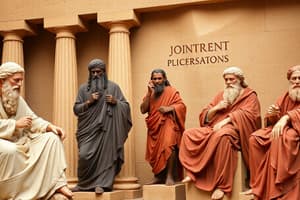Podcast
Questions and Answers
Who directly followed Socrates in the philosophical lineage?
Who directly followed Socrates in the philosophical lineage?
- Thales
- Anaximander
- Plato (correct)
- Aristotle
What was the primary concern of the Milesian philosophers?
What was the primary concern of the Milesian philosophers?
- Moral questions about man and society
- The origin of the world (correct)
- The problem of permanence and change
- The characteristics of the world
In which city is philosophy believed to have originated?
In which city is philosophy believed to have originated?
- Athens
- Crete
- Miletus (correct)
- Rome
Philosophy is fundamentally the pursuit of what?
Philosophy is fundamentally the pursuit of what?
Which statement best represents the definition of Scepticism?
Which statement best represents the definition of Scepticism?
What term is used to describe someone studying the nature of the universe?
What term is used to describe someone studying the nature of the universe?
Which philosopher sought a synthesis between rationalism and empiricism?
Which philosopher sought a synthesis between rationalism and empiricism?
Which school of thought emphasizes perceptual experience as the primary source of knowledge?
Which school of thought emphasizes perceptual experience as the primary source of knowledge?
What is the primary concern of metaphysics?
What is the primary concern of metaphysics?
Which philosopher is associated with the concept of 'tabula rasa'?
Which philosopher is associated with the concept of 'tabula rasa'?
Which branch of philosophy is concerned with the questions of 'why' and 'how'?
Which branch of philosophy is concerned with the questions of 'why' and 'how'?
The question of whether God exists is primarily a concern of which philosophical branch?
The question of whether God exists is primarily a concern of which philosophical branch?
The emergence of Sophists and Socrates shifted Greek philosophy towards which focus?
The emergence of Sophists and Socrates shifted Greek philosophy towards which focus?
Which philosopher is associated with the dictum 'man is the measure of all things'?
Which philosopher is associated with the dictum 'man is the measure of all things'?
Which year was the concept of human rights first articulated globally?
Which year was the concept of human rights first articulated globally?
Morality, from a philosophical perspective, derives from man's what?
Morality, from a philosophical perspective, derives from man's what?
Which branch of philosophy focuses on human knowledge?
Which branch of philosophy focuses on human knowledge?
Which philosopher is known for contributions to Analytic Philosophy?
Which philosopher is known for contributions to Analytic Philosophy?
Thomas Aquinas and Baruch Spinoza belong to which philosophical periods?
Thomas Aquinas and Baruch Spinoza belong to which philosophical periods?
What is another name for Aesthetics as a branch of philosophy?
What is another name for Aesthetics as a branch of philosophy?
Which philosopher developed the theory of the 'Apeiron' or the indeterminate boundless?
Which philosopher developed the theory of the 'Apeiron' or the indeterminate boundless?
What principle is linked to determining the rightness or wrongness of an action by the happiness or pain it produces?
What principle is linked to determining the rightness or wrongness of an action by the happiness or pain it produces?
Kant posited that objective scientific knowledge is achievable if we limit ourselves to the realm of __________.
Kant posited that objective scientific knowledge is achievable if we limit ourselves to the realm of __________.
One consequence of pragmatism as a contemporary philosophical movement is that it __________.
One consequence of pragmatism as a contemporary philosophical movement is that it __________.
Who are the three famous individuals that opposed the teachings of the Sophists in the Ancient period?
Who are the three famous individuals that opposed the teachings of the Sophists in the Ancient period?
What does the phrase 'Truth is what works' represent in contemporary philosophy?
What does the phrase 'Truth is what works' represent in contemporary philosophy?
Whose definition of philosophy as 'criticism of criticisms' highlights its relevance across all human endeavors?
Whose definition of philosophy as 'criticism of criticisms' highlights its relevance across all human endeavors?
Who is often regarded as the father of modern philosophy?
Who is often regarded as the father of modern philosophy?
In Plato’s philosophy, what refers to the nonmaterial essences of things?
In Plato’s philosophy, what refers to the nonmaterial essences of things?
According to Aristotle, a substance is a combination of which elements?
According to Aristotle, a substance is a combination of which elements?
Man is entitled to fundamental human rights by virtue of being which of the following?
Man is entitled to fundamental human rights by virtue of being which of the following?
What is the origin of the term metaphysics in Greek?
What is the origin of the term metaphysics in Greek?
According to Aristotle, what was the erroneous conception of reality before Socrates?
According to Aristotle, what was the erroneous conception of reality before Socrates?
Which law of thought expresses the principle that a statement is either true or false?
Which law of thought expresses the principle that a statement is either true or false?
Who is regarded as the earliest logician?
Who is regarded as the earliest logician?
Which argument moves from general to particular propositions?
Which argument moves from general to particular propositions?
Who among the following claimed Air as the primary substance or reality?
Who among the following claimed Air as the primary substance or reality?
According to which philosophical approach should economic rights constitute the content of human rights?
According to which philosophical approach should economic rights constitute the content of human rights?
Prior to the philosophical thoughts of the Milesians, Greek minds drew their sources primarily from what?
Prior to the philosophical thoughts of the Milesians, Greek minds drew their sources primarily from what?
The process of deriving one statement on the basis of others is known as what?
The process of deriving one statement on the basis of others is known as what?
Flashcards are hidden until you start studying
Study Notes
Ancient Greek Philosophers
- Thales was one of the first philosophers who believed that water was the primary substance of the universe.
- Anaximander proposed that the origin of the world was apeiron (indeterminate boundless).
- Anaximenes suggested air as the primary substance.
- Pythagoras was known for his mathematical theories and teachings, and believed that mathematics was the key to understanding the world.
- Heraclitus believed in the constant flux of reality and stated that everything is in a state of change.
- Protagoras famously said "Man is the measure of all things," reflecting his emphasis on human perception and subjectivity.
- Socrates was a significant figure who emphasized ethical considerations and used a method of questioning to gain knowledge. He believed that the pursuit of knowledge was the most important thing.
- Plato, a student of Socrates, developed theories on the world of Forms, which are eternal and unchanging.
- Aristotle, a student of Plato, focused on logic, physics, and ethics. His philosophy emphasized empirical observation and reason.
- Epicurus, a follower of Democritus, was a philosopher who believed in a materialistic view of the world.
Medieval Philosophers
- St. Augustine was an important early Christian philosopher who wrote about the nature of God, the soul, and the role of faith in human life. He was known for his famous quote, "City of God".
- Thomas Aquinas was a prominent philosopher during the medieval period and synthesized Aristotelian philosophy with Christian theology.
Modern Philosophers
- René Descartes was a French philosopher who believed in the power of reason. His famous statement, "I think, therefore I am," highlights his emphasis on self-awareness and skepticism.
- John Locke was an English philosopher who believed in natural rights and the idea of a "tabula rasa" (blank slate) mind at birth.
- Baruch Spinoza, a Dutch philosopher, believed in a deterministic view of the universe.
- Gottfried Leibniz, also a German philosopher, proposed that the universe is composed of monads, which are fundamental units of reality.
- Immanuel Kant, a German philosopher, believed in the importance of both reason and experience in acquiring knowledge.
- David Hume, a Scottish philosopher, was a skeptic who argued against the existence of God. He believed in empiricism.
- Thomas Hobbes, an English philosopher, argued in favor of a strong sovereign to maintain order and stability.
Contemporary Philosophers
- Soren Kierkegaard, a Danish theologian and philosopher, emphasized the importance of individual choice and the pursuit of authenticity.
- Friedrich Nietzsche, a German philosopher, was known for his ideas about the death of God, the will to power, and the importance of individual self-creation.
- Martin Heidegger, a German philosopher, was known for his work on the nature of being and his critique of modern technology.
- Jean-Paul Sartre, a French philosopher, was a key figure in existentialism. Believed that individuals are free and responsible for their own choices.
- Karl Marx, a German philosopher and economist, developed a theory of historical materialism and criticized capitalism as an exploitative economic system.
- John Dewey, an American philosopher, was a proponent of pragmatism and the educational reform movement.
- Charles Sanders Peirce, an American philosopher, is credited with the development of pragmatism as a philosophical school of thought.
- Ludwig Wittgenstein, an Austrian philosopher, is known for his work on the nature of language.
Other concepts
- Metaphysics: Deals with questions about the nature of reality.
- Epistemology: Focused on the nature of knowledge.
- Ethics: An area of philosophy concerned with morality, values, and the good life.
- Aesthetics: Deals with beauty, art, and the nature of aesthetic experience.
- Logic: Focuses on reasoning, arguments, and validity.
- Pragmatism: Emphasizes the practical consequences of ideas.
- Existentialism: A school of thought that emphasizes individual freedom and responsibility.
Additional Information
-
Human Rights: The Universal Declaration of Human Rights, drafted in 1948, was a significant step in the development of a universal understanding of human rights.
-
National Development: Different philosophical perspectives exist regarding what constitutes true national development. While some emphasize economic growth, others prioritize human development and well-being.
-
Logical Positivism: This school of thought emphasizes the empirical verification of knowledge and rejects metaphysical claims that are not grounded in empirical observation.
-
Deductive Argument: This type of argument moves from general principles to specific conclusions.
-
Inductive Argument: This type of argument moves from specific observations to general conclusions.
Studying That Suits You
Use AI to generate personalized quizzes and flashcards to suit your learning preferences.



